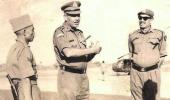'...they were shockedto learn that just 352 Indian soldiers had made 3 Pakistan army brigadiers, 2 colonels, 170 officers, 290 JCOs and 8,000 troops surrender to the Indian Army.'
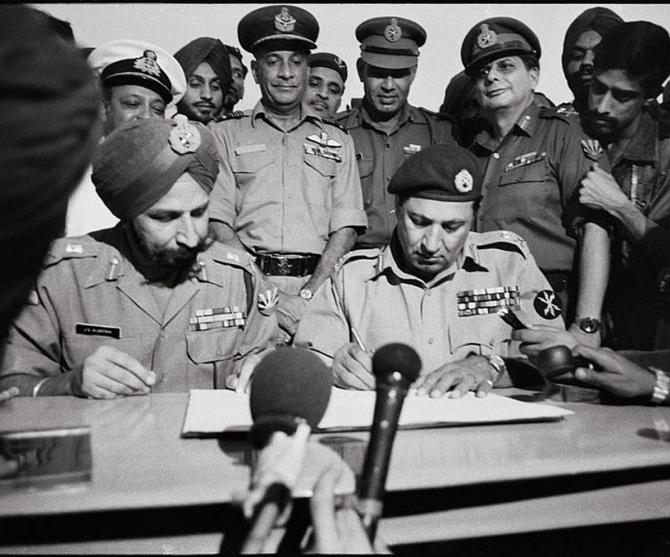
Among the Indian military officers present: Eastern Army Commander Lieutenant General Jagjit Singh Aurora, Major General J F R 'Jake' Jacob, Chief of Staff, Eastern Command, Lieutenant General Sagat Singh, General Officer Commanding 4 Corps and the general who 'liberated' Bangladesh, Air Marshal Hari Chand 'Harry' Dewan, Commander in Chief, Eastern Air Command, Vice Admiral Nilkanta Krishnan, Flag Officer Commanding-in-Chief, Eastern Naval Command. Photograph: DPR Photo Division Archives
Major General Ian Cardozo, who amputated his severed mine-blown leg on the battlefield in the 1971 War, is 86 now.
He continues to work four-five hours every single day. Up to a few years ago, he used to keep longer hours, till his artificial leg started giving some problems.
It does not fit very well and has restricted movement, but the general, a military legend, has soldiered on.
The general had just returned from a trip to Chandigarh-Panchkula-Mohali when Rediff.com's Archana Masih spoke to him over a delightful hour-long conversation filled with wonderful anecdotes from his rich and monumental life.
In the 1971 War with Pakistan, he was a 31-year-old major. He had fought three back to back battles with his battalion. Then he stepped on Pakistani landmine which blew his leg, leaving it hanging with cartilage and some shreds of bone.
There was no morphine available because the medical supplies had been blown up in a Pakistan attack. A helicopter evacuation had been asked for, but blood was gushing out in spurts and he knew the foot could not be saved.
In an epic display of courage, he cut off his own leg with a khukri [traditional knife carried by soldiers of the Gorkha Regiment] to save his life.
As the leg fell to the ground, he told his batman to go and bury it.
The officer underwent a long treatment and rehabilitation at the Military Hospital and the Artificial Limb Replacement Centre in Pune.
He learned to walk, climb, run, swim and went back to his troops whom he loved so much.
He bravely overcame his disability to become the first war disabled officer to command an infantry battalion and a division.
He retired as chief of staff of a corps in the North East after nearly 40 years of service and extensively worked for the rehabilitation of war wounded soldiers.
A military historian, he has written a highly acclaimed autobiography Cartoos Sahib and 1971: Stories Of Grit And Glory From The Indo-Pak War. His just published book, Beyond Fear is a collection of true stories drawn from life in the armed forces
"Leading men into battle is a privilege which is not given to many people. This is the ethos of the Indian Army. We believe that we are dispensable, but the honour of the country is not," the general says in an inspiring conversation.
- Part 1 of the Interview: 'American or Chinese soldiers are not a patch on Indian soldiers'
Who are the military officers and men that have inspired you and why?
Right from the time we enter the academy (the National Defence Academy, where his name can be found on the merit board in the cadets' mess hall for his all round performance at the NDA, back in 1957), we are taught that the country comes first, soldiers next and yourself last. This is our military culture.
Leading men into battle is a privilege which is not given to many people. It is an awesome responsibility because it lies on the shoulders of a lone officer. When an officer goes into battle, he doesn't tell his men, 'Go ahead,' he says, 'Follow me.'
The officers of the Indian Army lead from the front. They face the enemy and their men follow their command into battle.
In the 1971 War, my battalion fought three battles one after the other in the short period of the war.
In the final battle of Sylhet [in then East Pakistan] which was India's first heli-borne operation, we had received wrong information that the Pakistani brigade that was holding Sylhet had moved to Dhaka.
It had not; in fact, it had been further reinforced by another brigade.
To cut a long story short, we fought them for nine days without food, water and reduced ammunition. When they surrendered to us, they were shocked to learn that we were just 352 in strength and we were shocked that 3 brigadiers, 2 colonels, 170 officers, 290 JCOs and 8,000 troops had surrendered to us!
This is the ethos of the Indian Army. We believe that we are dispensable, but the honour of the country is not. It is this belief that leads to the right conduct in war and peace.
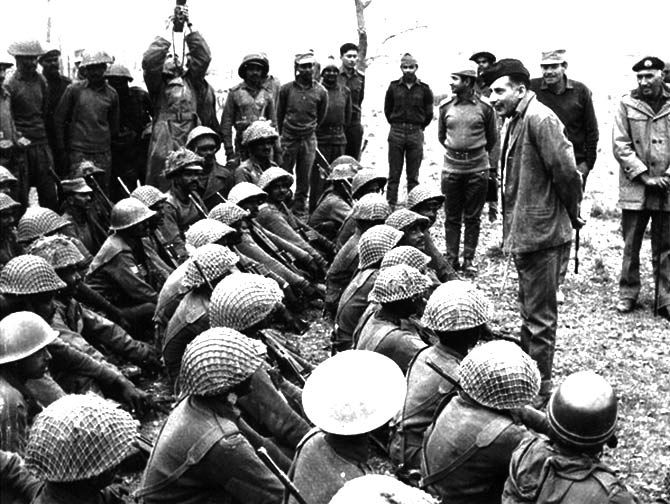
When you look back on your distinguished career and rich life, what are the moments that have given you most happiness?
One such moment was when I was at the National Defence Academy. I had a bout against the boxing captain who was a champion. My squadron commander wanted us to win the inter squadron championship and we could have only done so if we won the hockey match which was the final event.
I was the captain of my hockey team. The hockey match and boxing final were on the same day and my squadron commander didn't want me to fight [and play the hockey match instead].
I said no, I can't walk away from this fight.
I fought and got the thrashing of my life!
I was bleeding profusely and finally, the squadron commander threw a towel into the ring. The referee, who was a national boxer himself, asked if I wanted to fight or give up.
I said, 'I will fight.'
Many years later when my son went on to join the army after me and was posted in Dalhousie, the then army chief, General S Padmanabhan made a visit. When he was introduced to the officers, he read the badge on my son's chest and asked him if he was related to Major General Cardozo.
My son said, 'Yes, Sir, he is my dad'.
The chief asked, 'Has your dad told you about the thrashing he got at NDA?'
My son replied, 'No, Sir'.
General Padmanabhan said, 'Ask him'
This is just to tell you that this fight was remembered by many because I refused to give up. [General Padmanabhan was Major General Cardozo's junior at the academy].
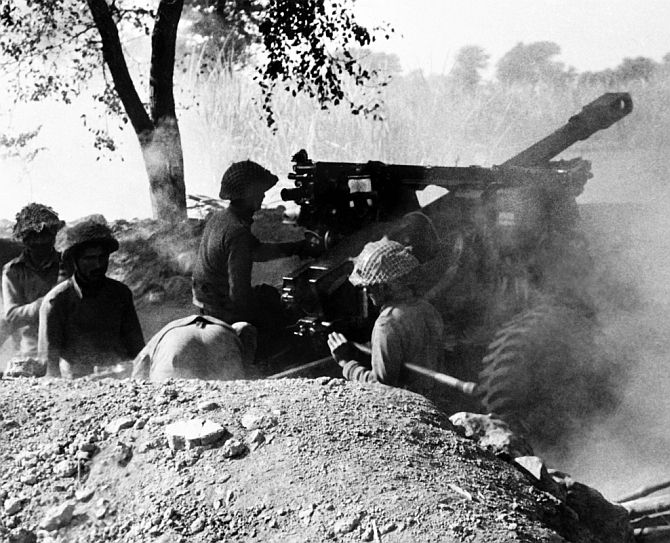
What fills you with pride and what brings you despair about the India of today?
The landing of Chandrayan 3 fills me with immense pride.
The progress we have made in building roads and infrastructure is something to be proud of, but we need to stand united as a nation.
When we won the 1971 War with Pakistan, India had a Parsi army chief General Sam Manekshaw, a Sikh commander of the Eastern Army Command, Lieutenant General Jagjit Singh Aurora, a Jew Chief of Staff of the Eastern Command, Major General J F R Jacob, an Anglo-Indian Director of Military Operations, General Inderjit Gill -- and we had corps commanders, officers and men who were from various faiths.
They all fought together, shed their blood together, and brought victory for India.
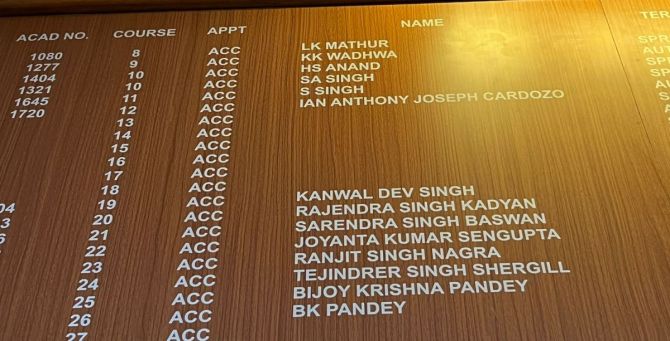
As a military legend, what would be your message to India's people and to its leaders?
To take a look at India's past, values, heritage, tradition and culture. Don't ape the West. Do what is right irrespective of the consequences -- and put the country first, always and every time.
You are a prolific writer. What is your writing schedule like?
I used to write for about six to eight hours every day, but now I am 86 years old and my artificial leg is not fitting properly.
I have a problem walking and age is catching up, therefore, I now write about three to four hours a day. But I work every day on a variety of subjects. I also write poetry and am bringing out illustrated stories with a friend on the Param Vir Chakra awardees.
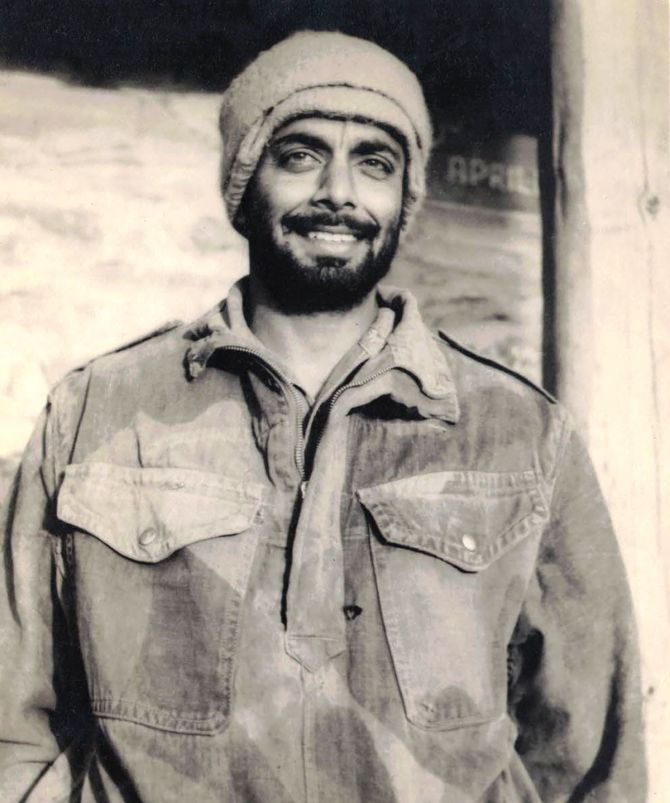
What is a day in your life like?
My life is what it is because of my wife Priscilla Cardozo. She is my lifeblood. She's my support and my everything.
She brought up our three boys on her own because I was always on the border.
I will not be able to do what I do without her and this applies to all army wives and mothers.
They need to get more recognition for what they do and who they are.
Feature Presentation: Aslam Hunani/Rediff.com



